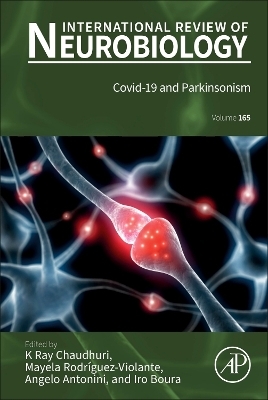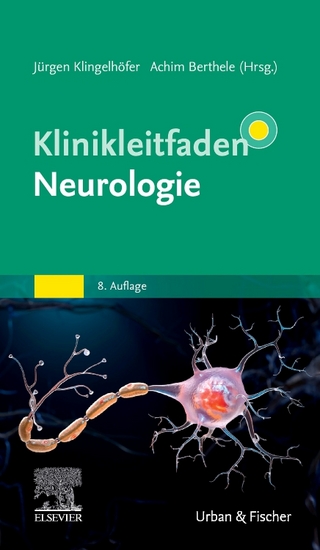
Covid-19 and Parkinsonism
Academic Press Inc (Verlag)
978-0-323-99173-5 (ISBN)
Additional sections cover Covid-19 and Parkinson’s Disease: nursing care, vaccination, telemedicine services, impact on advanced therapies, Covid-19-induced parkinsonism: Real life phenoconversion cases, Loneliness and impact of lockdown on Parkinson’s Disease patients during the Covid-19 pandemic, Parkinson’s Disease and Covid-19: Impact of ethnicity and palliative care, and more.
Professor K. Ray Chaudhuri is Professor of Neurology/Movement Disorders at King’s College Hospital and King’s College London and Director of the Parkinson Foundation International Centre of Excellence at King’s College. He is Chairman of the Industry Engagement Committee, and Co Chair Task force of the Parkinson Wellness committee of the Movement Disorders Society (MDS and Ex Chair Membership and Public Relations Committee of the Movement Disorders Society (MDS), was a member of the MDS Congress Scientific Programme Committee (2013-2017) and is Founder and Ex Chairman and current steering group member of the MDS Non-Motor Parkinson’s Disease Study Group and a member of the MDS-ES Education committee and Evidence Based Medicine committee (Nonmotor symptoms). He was the founder -Editor-in-Chief of the njp Parkinson’s Disease (2020 impact factor >8), Guest Editor for special editions of Frontiers in Neurology and Journal of Parkinson’s Disease, reviewer for all mainstream movement disorders journals as well as JAMA, Neurology, Annals of Neurology, BMJ, Brain, Lancet, and Journal of Neurology, Neurosurgery, and Psychiatry. He serves as an advisor (MHRA health technology and scientific advisor) to the UK National Institute for Health and Care Excellence, NHS England, General Medical Council as well as Parkinson’s UK and Parkinson’s Europe. Professor Chaudhuri is the author of over 500 articles, co-editor of 5 books on Parkinson’s disease and restless legs syndrome, and winner of the British Medical Association Book Awards commendation in 2015 and 2017. He is also the recipient of 2018 Jay Van Andel Award Outstanding Achievement in Parkinson’s Disease Research (pioneering holistic assessments and non-motor subtypes), as well as National Institute for Health Research/Royal College of Physicians award for outstanding research leadership in 2017. He was elected honorary member of the Movement Disorders Society in 2021, Honorary Professor Brasov University, Honorary Professor SRM University, India and received the UK NHS Gold merit award in 2021 for excellence in research and clinical service. In 2023 he was featured as “role model in British Medical Journal. He has been a guest lecturer worldwide, including in Japan, China, Taiwan, Vietnam, Thailand, Singapore, Australia, India, Africa, the US, Russia, and Europe. In 2022/2023 he is ranked fourth in the world for Parkinson’s publications/expertise and expertise since 2014 and no 1 in the UK (expertscape: Parkinson’s disease). Attending neurologist at the National Institute of Neurology and Neurosurgery in Mexico City. Responsible of the Clinical Neurodegenerative Research Unit. Movement disorders training at the Hospital Clinic de Barcelona. Master in Sciences granted by the UNAM. Member of the National Research System (SNI level 3). Member of the National Academy of Medicine. Principal Professor of the Parkinson’s disease and Movement Disorders high specialty course recognized by the Health’s Ministry and the UNAM Angelo Antonini graduated in Medicine in 1986 and completed Neurology training in 1990 at the University of Rome “La Sapienza in Rome where he developed skills in neuropharmacology and movement disorders. After obtaining a scholarship in 1990, in 1991 he started a PhD in Neuroradiology with PET and MRI at the University of Zurich and the Institute of Physics Paul Scherrer in Villigen, Switzerland, which he completed in 1994. PET studies focused on the dopaminergic system, metabolic disorders and cerebral blood flow in healthy subjects, in Parkinson patients and with other movement disorders as well as psychiatric disorders. MRI studies focused on the study of signal T2 and its relationship with free iron as degeneration biomarkers. After one year as Post- Doc in Zurich, in October 1995 he continued his research at the Neuroimaging Laboratory of NY Shore University Hospital and was promoted to Assistant Professor at New University York. During this period, the research focused on the study of brain networks and their modulation with pharmacological and surgical interventions. In November 1997, he returned to Italy in Milan at the Parkinson Institute where he contributed to the development of a research centre for Parkinson’s disease and implemented clinical trials and functional surgery at the Department of Neuroscience in collaboration with the University of Milan -Bicocca. In 2010 he moved to Venice in the National Research Institute San Camillo where he is responsible of the Unit for Parkinson and Movement Disorders and became Associate Professor of Neurology at the University of Padua. During his career, he received several academic awards and funding (including an ongoing Horizon2020 project), published over 340 peer reviewed manuscripts, has a H-Index (Scopus) of 62 and over 13000 citations. He has been an invited speaker at national and international neurology congresses in over 40 countries around the world. He has organized international courses and conferences. He is an honorary member of the Society of Neurology of France and of Romania. It serves as a reviewer for the main neurological journals. He is a Fellow of the European Academy of Neurology, President Elect of the European Section of the Movement Disorders Society and Auditor of the Italian Parkinson’s and Movement Disorders Academy. Iro Boura, MD, MSc is a PhD student at the University of Crete in Heraklion, Greece, investigating the neurogenetics and phenomenology of Parkinson’s Disease on the island of Crete, and is currently employed as a Neurology Consultant in the General Hospital of Chania in Crete, Greece. Prior to this position, she worked as a clinical research fellow in the Institute of Psychiatry, Psychology & Neuroscience, King’s College London, UK and at King’s College Hospital NHS Foundation Trust in London, UK under the supervision of Prof K. Ray Chaudhuri. She is currently continuing their collaboration as an affiliated member at King’s College London and the Parkinson’s Foundation Centre of Excellence in King’s College Hospital, UK. Dr. Boura received her MSc in Mental Health and Neuropsychiatry from the National and Kapodistrian University of Athens, Greece. During the past few years she has been involved in numerous publications and presentations relevant to Parkinson’s Disease.
1. Parkinsonism associated with viral infection Irina Ivan, Laura Irincu, ?tefania Diaconu, Cristian Falup-Pecurariu 2. Covid-19, nervous system pathology, and Parkinson’s disease: bench to bedside Aron Emmi, Iro Boura, Vanessa Raeder, Donna Mathew, David Sulzer, James E. Goldman, Valentina Leta 3. Prevalence and outcomes of Covid-19 in Parkinson’s disease: Acute settings and hospital Conor Fearon, Alfonso Fasano 4. Covid-19 and Parkinson’s disease: acute clinical implications, long-COVID and post-Covid-19 parkinsonism Valentina Leta, Iro Boura, Daniel J. van Wamelen, Mayela Rodríguez-Violante, Angelo Antonini, K. Ray Chaudhuri 5. Smell deficits in Covid-19 and possible links with Parkinson’s disease Aron Emmi, Michele Sandre, Andrea Porzionato, Angelo Antonini 6. Spotlight on non-motor symptoms and Covid-19 Silvia Rota, Iro Boura, Yi-Min Wan, Claudia Lazcano-Ocampo, Mayela Rodríguez-Violante, Angelo Antonini, K. Ray Chaudhuri 7. Treatment paradigms in Parkinson’s disease patients and Covid-19 Iro Boura, Lucia Batzu, Espen Dietrichs, K. Ray Chaudhuri 8. Covid-19 and Parkinson’s disease: Nursing care, vaccination and impact on advanced therapies Anna Roszmann, Aleksandra M. Podlewska, Yue Hui Lau, Iro Boura, Annette Hand 9. Social Isolation, loneliness and mental health sequelae of the Covid-19 pandemic in Parkinson’s disease Bradley McDaniels, Indu Subramanian 10. Parkinson’s disease and Covid-19: Is there an impact of ethnicity and the need for palliative care Katarina Rukavina, Victor McConvey, K. Ray Chaudhuri, Janis Miyasaki 11. Covid-19 : The Cynosure of Rise of Parkinson’s Disease Prashanth Lingappa Kukkle 12. Parkinson’s disease and Covid-19: The Effect and Use of Telemedicine Aleksandra M. Podlewska, Daniel J. van Wamelen 13. Impact of Covid-19 on research and training in Parkinson’s disease Yi-Min Wan, Daniel J. van Wamelen, Yue Hui Lau, Silvia Rota, Eng-King Tan
| Erscheinungsdatum | 15.09.2022 |
|---|---|
| Reihe/Serie | International Review of Neurobiology |
| Verlagsort | Oxford |
| Sprache | englisch |
| Maße | 152 x 229 mm |
| Gewicht | 630 g |
| Themenwelt | Medizin / Pharmazie ► Medizinische Fachgebiete ► Neurologie |
| Naturwissenschaften ► Biologie ► Humanbiologie | |
| Naturwissenschaften ► Biologie ► Zoologie | |
| ISBN-10 | 0-323-99173-4 / 0323991734 |
| ISBN-13 | 978-0-323-99173-5 / 9780323991735 |
| Zustand | Neuware |
| Informationen gemäß Produktsicherheitsverordnung (GPSR) | |
| Haben Sie eine Frage zum Produkt? |
aus dem Bereich


